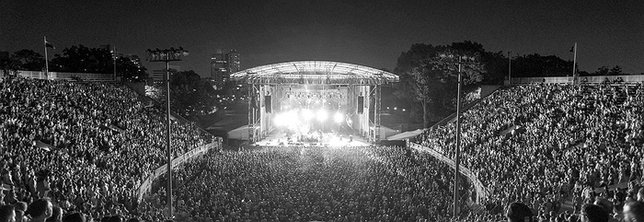Forest Hills Stadium, a historic concert venue in Queens, New York, has recently been at the center of legal controversies due to noise complaints and allegations of public nuisance by local residents. The legal battles reflect a community torn between preserving cultural events and maintaining residential peace.
A Tale of Two Lawsuits
The venue faced two significant lawsuits. The first, initiated by the group Concerned Citizens of Forest Hills, was dismissed by Queens Supreme Court Justice Robert Caloras. The judge ruled that the group lacked standing and failed to demonstrate that they suffered more harm than the community at large. This decision was met with relief by the venue’s management, who viewed the lawsuit as a threat to their operations which have been a staple of the community since the 1920s.
The second lawsuit, ongoing and filed by the Forest Hills Gardens Corporation (FHGC), centers on more concrete complaints about noise levels and crowd control. This suit has resulted in a court-ordered injunction requiring the stadium to implement noise reduction measures and better manage the flow of concertgoers to minimize disruptions to local residents.
Community and Economic Impacts
The venue’s increase in events from five concerts in 2014 to 31 in 2023 has significantly impacted the local economy. Many businesses benefit from the influx of visitors on concert days, experiencing increased sales and customer traffic. However, this economic boost comes with challenges for residents, including increased noise and occasional trespassing on private properties during events. In response, the stadium has invested heavily in noise mitigation efforts, although the effectiveness of these measures has been a point of contention.
Public Opinion and Venue Defense
Despite the lawsuits, there is substantial community support for the venue. A petition initiated by the West Side Tennis Club, which owns the stadium, garnered over 25,000 signatures, indicating strong local and fan support for the continuation of concerts. This support is crucial as the stadium balances being a good neighbor with its role as a cultural hub. Venue representatives emphasize their commitment to complying with city regulations and improving relations with local residents.
Legal Resolution and Future Outlook
While one lawsuit against Forest Hills Stadium has been dismissed, another remains in the legal system, keeping the venue's future activities under scrutiny. The dismissed case, brought by Concerned Citizens of Forest Hills, failed due to the group's inability to demonstrate sufficient direct harm compared to the broader community. This decision has allowed the stadium to continue its operations for now, though the second lawsuit, brought by the Forest Hills Gardens Corporation, continues to challenge the venue on issues of noise control and crowd management.
As these legal proceedings unfold, the stadium remains a point of contention in the community, balancing its historical significance and economic impact against the needs and comfort of local residents. The ongoing lawsuit will further define the operational constraints and community relations for the venue, potentially influencing how similar disputes are handled in other regions.
The developments in these cases will be pivotal for the stakeholders involved, and will likely influence future policy and operational decisions for the stadium. The community's active engagement in these matters highlights the complex interplay between cultural significance and residential quality of life in urban settings.










